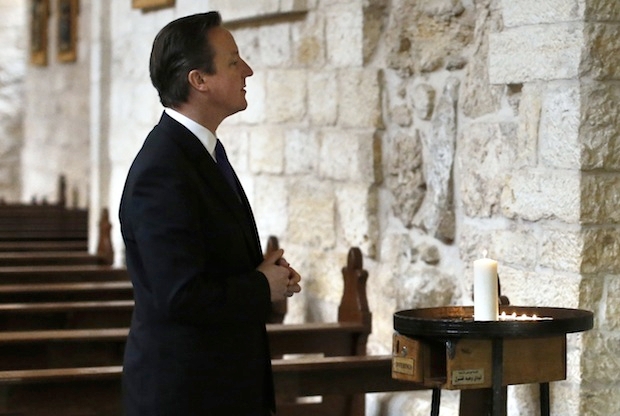David Cameron’s decision to hug-a-Christian seems to have worked pretty well, judging by the political response he’s provoked. For starters, his comments about Britain being ‘evangelical’ about its status as a Christian country managed to enrage the sort of people who also might annoy the churchgoing conservatives he needs to win back after the row over gay marriage.
Today, he – and the secularists – got a response from the Archbishop of Canterbury who wrote on his blog:
‘It’s all quite baffling and at the same time quite encouraging. Christian faith is much more vulnerable to comfortable indifference than to hatred and opposition. It’s also a variation on the normal “Sword and Grail discovered” stuff that seems to be a feature of Easter week news.
‘Yet the Prime Minister and other members of the Government have not said anything very controversial. It is a historical fact (perhaps unwelcome to some, but true) that our main systems of ethics, the way we do law and justice, the values of society, how we decide what is fair, the protection of the poor, and most of the way we look at society . . . All have been shaped by and founded on Christianity. Add to that the foundation of many hospitals, the system of universal schooling, the presence of chaplains in prisons, and one could go on a long time. Then there is the literature, visual art, music and culture that have formed our understandings of beauty and worth since Anglo Saxon days.
‘It is clear that, in the general sense of being founded in Christian faith, this is a Christian country. It is certainly not in terms of regular churchgoing, although altogether, across different denominations, some millions attend church services each week.’
Welby isn’t afraid to criticise government policies when he feels he should. But today he ended his post with ‘the PM is right on this’. So a good score there for the Prime Minister, who, like most politicians, is still pretty keen to get an endorsement from the Archbishop of Canterbury (and sensitive to his criticism). And it was wise of the ABC not to engage with some of the attempts by the PM’s critics to open windows into his soul and question the sincerity of his decision to do a bit more God.
But there was one more helpful response to Cameron’s Church Times piece, and it came from Nick Clegg. The Deputy Prime Minister told LBC:
‘As it happens, I’m not a man of faith, but I don’t actually find it particularly controversial to say just look at our history, our heritage, our architecture, our values, or something… of course, you know, of course it’s infused by Christianity. In many ways I was slightly nonplussed by people getting very worked up about because I thought, well, you know, I’m not a practising man of faith but I don’t find it an issue to say, you know, we have an important, sort of, Christian identity in terms of our history and heritage and so on.
‘That is not to say, Paul [the listener calling in], which I think is maybe what lies behind your question, that somehow we are exclusively Christian, that somehow everybody is a Christian, or indeed that we have got one Christian denomination, there are almost as many Catholics as Anglicans in this country, and of course we should remember that one of the greatest Christian values, if you want to put it that way, of tolerance is that we are open to people of other denominations, other faiths, of all faiths, and none and I think that is what makes our country, it’s this sense of fair play and tolerance which I think makes our country very, very special.
‘I mean, more generally speaking, er, about the separation of religion and politics, as it happens, my personal view, I’m not pretending this is something which is discussed in the pubs and kitchen tables of Britain but my personal view is in the long run, having the state and the church basically bound up with each other as we do in this country, I think, you know, I think in the long-run it would actually be better for the church and better for people of faith and better for Anglicans if the church and state were over time to sort of stand on their own two separate feet, so to speak.’
This, while being a polite defence of what Cameron said, also gave the Prime Minister a nice little point of difference with his Coalition colleague, which is always a good thing. He responded this afternoon to Clegg’s call for eventual disestablishment by saying:
‘No I don’t want to see that, I think our arrangements work well in this country. As I’ve said before, we’re a Christian country, we have an established church, and being a Christian country, I find other faith leaders and members of other faiths say that it makes us almost more understanding, more tolerant, more understanding of the role that faith and religion plays in our country.
‘And actually, faith organisations do an enormous amount in terms of supporting schools, supporting charities, helping to build what I call the bigger society. So I don’t want to see what the Deputy Prime Minister has set out, it’s a long-term liberal idea but not a Conservative one.’
So there we go. An endorsement from the Archbishop of Canterbury and a gentle division with Nick Clegg. Whether this will make much of a difference with those churchgoers that the Prime Minister might be making overtures to is another matter. But his article in the Church Times has been a communications success, at least.







Comments